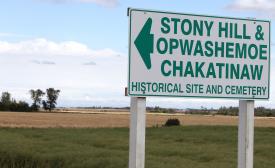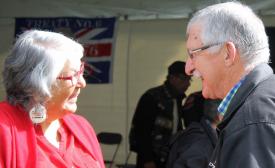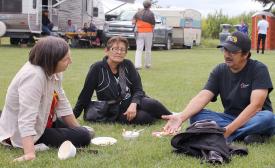Zion Mennonite Fellowship lends a hand to its neighbours
For anyone who lives in Elmira and needs a ladder to clean out his eavestroughs or get a Frisbee off her roof, call Bruce Weber.
For anyone who lives in Elmira and needs a ladder to clean out his eavestroughs or get a Frisbee off her roof, call Bruce Weber.
For families with children who have exceptional needs, taking a summer vacation may seem like nothing more than an elusive dream. But now a groundbreaking program offered by Christian Horizons is making that dream come true for some families.
On Sept. 2, 2015, the heartbreaking picture of Alan Kurdi’s body on the shores of the Mediterranean Sea was a wake-up call to the world.
On September 2, 2015, the heartbreaking picture of Alan Kurdi’s body on the shores of the Mediterranean Sea was a wake-up call to the world concerning the plight of refugees. In the nine months between September of last year and the end of June 2016, Mennonite Central Committee (MCC) Canada assisted in the arrival of almost 1100 refugees.
For decades, Colombia has been known for violence, narcotics and instability. But now it is within sight of an historic peace agreement that César García—the Colombian who heads Mennonite World Conference, which is based in the country—says mirrors notions of restorative justice valued by many Anabaptists.

The sign directing people to Stony Hill, the former site of St. John’s Lutheran Church and of the Young Chippewayan Reserve No. 107, was changed earlier this year to reflect its importance to indigenous people. The name Opwashemoe Chakatinaw means Stoney Knoll in English. (Photo by Donna Schulz)

Chief Sylvia Weenie of the Young Chippewayan band chats with Leonard Doell, coordinator of Mennonite Central Committee Saskatchewan’s Indigenous Neighbours Program, at the 140th anniversary of the signing of Treaty 6, held recently at Stoney Knoll. (Photo by Donna Schulz)

With her daughter Kimberley holding her notes, Chief Sylvia Weenie addresses the audience gathered to mark the 140th anniversary of the signing of Treaty 6. ‘Stoney Knoll history needs to be told,’ she says. ‘Our children need to know.’ (Photo by Donna Schulz)

Rita Macdonald of Rosthern Mennonite Church, left, visits with Marshall Williams and his wife Verna at the 140th anniversary of the signing of Treaty 6, held recently at Stoney Knoll, Sask. Williams is the hereditary chief of the Young Chippewayan band. (Photo by Donna Schulz)
“It’s really cool to see white people here today,” said Cheyenne Fineday. The first nation teenager was speaking at the 140th anniversary of the signing of Treaty 6 on Aug. 23, 2016. Held at Stoney Knoll, 76 kilometres north of Saskatoon, the celebration included both indigenous and settler peoples.
The passions that inspired Winnipeg’s community shared agriculture (CSA) movement and the famous Tall Grass Prairie Bakery are now making waves around the world, from Winnipeg to Hokkaido, Japan, and back.
The ongoing discussion about medical assistance in dying has publicly raised questions that extend beyond the realm of politics and public policy to the bedrock of morality.
Raising awareness and funds for the ongoing demands of the global refugee crisis was the goal of a “ration meal” lunch hosted by Canadian Foodgrains Bank at Sam’s Place in Winnipeg on June 20, 2016, to honour World Refugee Day.
Take almost 200 mostly Mennonite peacebuilders from around the world, bring them together for four days in June 2016, at Conrad Grebel University College in Waterloo, liberally mix in keynote speakers, 30-plus workshops, warm sunshine, a concert and original play on conscientious objectors, and you have the making of a fabulous four days of building peace in the world—a world where there is non
The way Ross Shantz remembers it, his father Ward contacted his buddies from the Second World War conscientious objector camp at Montreal River and they began the New Hamburg Mennonite Relief Sale in 1967.
The auction began. Among the crowds in Coaldale for the annual Mennonite Central Committee (MCC) Alberta Relief Sale on June 10 and 11, stood two Syrian men whose families had recently been assisted by MCC and sponsored by Mennonite churches to resettle in Canada. To their surprise, a loaf of bread was auctioned off for $200!
The rain that fell on the morning of June 18 didn’t stop a group of walkers from making a three-kilometre trek in support of the upcoming World Refugee Day.
Participants at the Mennonite Historical Society of Alberta spring conference, held on April 30, 2016, at Holyrood Mennonite Church, Edmonton, spent time “Rethinking Mennonite history in light of the Truth and Reconciliation Commission,” the theme of this year’s event.
“America is again ablaze with partisan divisiveness.” That’s how I started an article during the presidential campaign of 2012. But the days of Barack Obama battling Mitt Romney seem pedestrian compared to the current convergence of reality TV and reality.
Colourful paper cranes folded neatly over words of prayer. Bowls of floating candles melting together as one. A smudging ceremony rich with prayer that took five times as long as organizers thought it would because so many people took part.
“Don’t get too used to this kind of event,” said Rick Cober Bauman, executive director of Mennonite Central Committee (MCC) Ontario, to gales of warm laughter as he welcomed around 500 participants to the organization’s “first-ever signature event,” a four-course dinner at the St. George Banquet Hall in Waterloo on March 30.
A farmer disappointed by tumbling returns on his cassava crop is still eager to use a portion of his property for a future youth Bible camp facility. Another man is excited to witness to Christ in his secular job.
A futsal (soccer) park project in Gaborone, Botswana, is springing to life with the help of children who are following God’s lead. Despite an encouraging start to this development, we ran into a number of obstacles along the way that made us wonder if God was calling us to continue or let the project go.
The Ojibway word for medicine is mush-ki-ki, meaning “strength of the earth” or “power from the soil,” explained David Daniels of Long Plain First Nation, located near Portage La Prairie, Man., in First Nations Voice some years ago.
Listening on both sides is vital as indigenous people and settlers continue to learn to walk beside, and relate to, each other.
Jules Koostachin began her journey to dance in a jingle dress as an act of intergenerational healing, thinking that she would complete it in a year.
For the most part, Syrians forced from their homes dream not of going to Europe or Canada, but of going back home. “They are in love with their country,” say Mennonite Central Committee (MCC) representatives for Lebanon and Syria, who cannot be named for security reasons.
The federal government sometimes “matches” donations made by Canadians for specific causes. Does this mean that if you give $100 to MCC for Syria, Ottawa gives another $100 to MCC, and thus you can credit yourself with $200 going to Syria? In short, no on both counts.
Jane Philpott was elected to parliament and appointed Health Minister last fall. Prior to that, she worked as a family physician in Canada and also in Niger from 1989-98. Philpott and her husband Pep have four children and attend Community Mennonite Church in Stouffville, Ont. The minister spoke by phone with Canadian Mennonite’s Will Braun on Feb. 29, 2016.